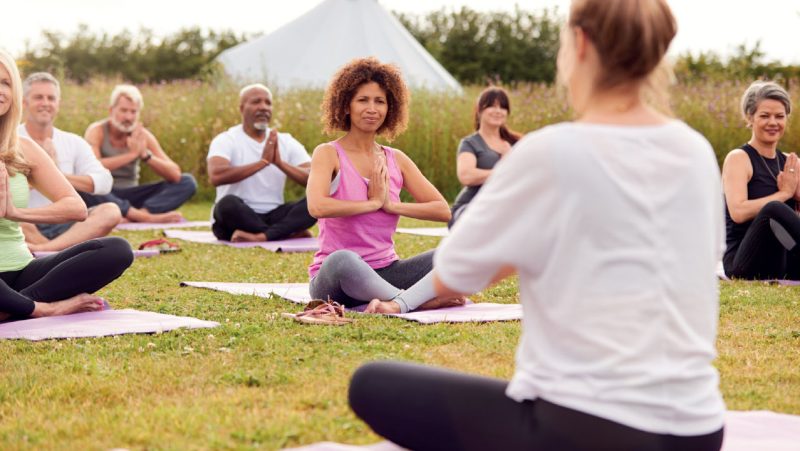
5 Types of Yoga That May Help
Ease C-PTSD Symptoms
Discover how specific yoga practices can support your mental and emotional recovery from complex trauma - By Beth Rush
Reading time: 3 minutes
Explore the best types of yoga for C-PTSD symptoms and their various benefits for your healing journey.
Complex post-traumatic stress disorder (C-PTSD) can significantly impact your life, leading to debilitating physical, mental and emotional symptoms. While there’s no one-size-fits-all treatment for healing, many individuals find relief through yoga. Discover the best types of yoga for C-PTSD.
What Is C-PTSD?
C-PTSD is a mental health condition that develops after an individual experiences long-term trauma. Many adult survivors of C-PTSD have either experienced any of the following:
- Long-term child physical or sexual abuse
- Domestic violence
- Being a victim of sex or human trafficking
- War
These are only some of the possible triggers of C-PTSD. Trauma can manifest in many ways, including physical, emotional and mental types of responses:
Physical responses:
- Trouble sleeping
- Feelings detached from family and activities you once enjoyed
- Self-destructive habits, such as substance misuse
- Sweating
- Increased heart rate
- Shaking
Mental responses:
- Anxiety
- Debilitating flashbacks of the traumatic event
- Memory problems
- Hypervigilance
- Avoidance of people, events and other possible triggers
- Negative thoughts and mood
5 Best Yoga for PTSD and the Benefits
Healing from C-PTSD is a journey. Fortunately, many types of yoga can help speed up recovery.
1. Trauma-Informed Yoga
Also known as trauma-sensitive yoga, this type of yoga helps you become aware of your body and release built-up stress, tension and emotions.
It’s one of the best types of yoga for PTSD because teachers offer options that will boost your comfort during the session. For instance, instead of doing poses with eyes closed, a trauma-informed instructor may encourage bowing the head instead since some people may feel scared closing their eyes.
2. Yoga Nidra
Yoga Nidra uses techniques that help put your body between being awake and asleep. It’s usually performed while lying down and does not involve complicated poses.
It can help you feel calm, warding off anxiety that can prevent you from enjoying the present. This period of focus and relaxation can help increase the levels of gamma-aminobutyric acid (GABA) — a neurotransmitter that regulates relaxation in the brain.
3. Hatha Yoga
Hatha yoga can help with heart rate variation (HRV), helping to balance the sympathetic and parasympathetic nervous systems.
It promotes various poses, including the downward-facing dog and standing forward bend, which can help reduce intrusive thoughts and negative feelings that may stop you from doing your daily tasks.
4. Restorative Yoga
If you enjoy passive stretching, you will benefit from restorative yoga. This type of yoga focuses on the meditative aspect of the practice. It entails holding yoga poses for longer periods with the support of props, such as blocks, bolsters and blankets.
Doing this regularly may help boost your relaxation, mood and overall well-being. It may also help alleviate the physical discomforts you might feel.
5. Kundalini Yoga
Kundalini yoga is ideal for forming a deeper connection with yoga. It combines several facets of yoga, including meditation, physical exercises, breathing strategies and mantras, to achieve healing.
Through Kundalini yoga, you can escape from stressful states and embrace peace. You can also explore how your body feels and learn to be more present, which is crucial in your long-term recovery.
The Journey to Healing Continues
Yoga offers a gentle and effective approach to managing C-PTSD, no matter where you are in your recovery journey. Remember that healing takes time, and with consistent yoga practice, you can achieve a better mental state.





